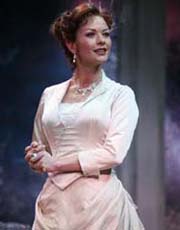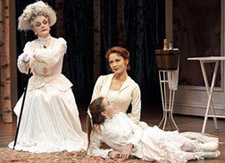Lucy Komisar
Sondheim's "A Little Night Music"
a keen observation of the foolishness of lovers
"A Little Night Music."
Walter Kerr Theatre, 219 West 48th Street, New York, NY.
Music & lyrics by Stephen Sondheim; book by Hugh Wheeler.
Directed by Trevor Nunn; choreographed by Lynne Page.
http://www.nightmusiconbroadway.com/
Opened December 13, 2009; closes June 20, reopens July 13, 2010.
Reviewed by Lucy Komisar December 17, 2009.
This almost tongue-in-cheek celebration of sex would imply that
passion begets foolishness, especially among men. As we watch
the absurdly shifting liaisons and desires among the mostly
upper class protagonists, we understand the genesis of the play's
famous song performed by the actress Desirée (Catherine
Zeta-Jones), "Quick, send in the clowns. Don't bother,
they're here."
 |
| Catherine
Zeta-Jones as Desirée, Photo by Joan Marcus. |
So, don't take too seriously this plot, which the playbill remarks
is "suggested" by the 1955 film "Smiles of a
Summer Night" by Ingmar Bergman, a master at plumbing the
psychology of lovers. It reminds one of the magical musical
chairs of Shakespeare's love comedies.
The 1973 play by Hugh Wheeler, with music and lyrics by Stephen
Sondheim and staging by Trevor Nunn, has much to delight audiences,
beginning with Sondheim's songs and their excellent renditions
by an accomplished cast. Unfortunately, the play often has a
sluggish pace and lacks the sparkle it deserves.
Set at the turn of the last century in Sweden, Wheeler's script
follows eight people who lust after each other in a "Ronde"
that goes through comic in-your-face conflicts before the various
lovers sort things out.
Catherine Zeta-Jones is smashing as the charming Desirée,
a touring actress in her 40s who, partly to forget the third
rate venues she plays, amuses herself with serial affairs, the
latest with a married military officer who is a bit of a jerk.
Her old flame, a fiftiesh businessman and widower, Fredrik Egerman
(Alexander Hanson), who apparently wants to recapture his youth,
can't get his 18-year-old second wife Anne (Ramona Mallory,
who has a lovely soprano voice), to consummate the marriage
after nearly a year. He considers whether he should ravish her
"Now," as the song says. He is definitely one of the
clowns.
Complicating matters, Hendrik, Fredrik's son by his late wife
and a seminary student, is infatuated with Anne, though he makes
a pass at the maid, Petra (terrifically played by Leih Ann Larkin),
who seems to have the healthiest attitude of all toward sex
– to enjoy it without complications of control or conquest.
 |
| Alexander
Hanson as Fredrik Egerman, Catherine Zeta-Jones as Desirée
and Aaron Lazer as the Count. Photo by Joan Marcus. |
Fredrik goes to see Desirée in a play.
Later, backstage, he admits his difficult marital situation
and wonders, "Would you?" And she replies, "What
are friends for?" But arriving at the most inconvenient
time is her current lover, the military office Count Carl-Magus
Malcolm (Aaron Lazar), an outrageous sexist. "In praise
of women," he sings: "God knows the foolishness about
them, But if one had to live without them, The world would surely
be a poorer, If purer, place."
And then the riposte from the women left behind. The count's
wife Charlotte (Erin Davie, who plays a very good drunk) is
quite au courant about what is going on. And miserable, and
helpless. Charlotte and Ann sing a plaintive duet, "Every
day, a little death," in which they declare "Men are
stupid, men are vain, Love's disgusting, love's insane, A humiliating
business!" Well-placed ace by Sondheim.
 |
| Angela
Lansbury as Madame Armfeldt, Catherine Zeta-Jones as Desirée
and Keaton Whittaker as her daughter, Fredrika. Photo by
Joan Marcus. |
All will come together and sparks will fly when
Desirée organizes a house party, a weekend at the country
estate of her mother, Madame Armfeldf (the grand Angela Lansbury)
who muses about her history of opportunistic liaisons with royals
and offers pithy advice to Desirée's daughter, Fredrika,
13, (Keaton Whittaker). (Do you wonder about the origin of the
young woman's name?) Madame, dressed in a black ruffled silk
dress with long glittering neck piece, felicitously describes
sex as "a pleasurable means to a measurable end."
Another point for Sondheim.
"A weekend in the country" is a show-stopping company
highlight. And the stage for the dénouement. Everyone
is invited. The two rivals, the solider and Egerman, are ready
to duke it out, but then in "It would have been wonderful,"
commiserate about how much they are in unhappy thrall to Desirée.
Only Egerman's maid and Madame Armfeldt's butler, Frid (Bradley
Dean), seem to be having a good time with each other.
The deceptions are carried out in waltz time as if to heighten
the fantasy of it all. The sets and costumes (by David Farley)
in white and gray — white painted glass doors and windows
and birch trees — add to the ethereal mood.
Nunn's production excels as an operetta, but sometimes falls
down as acting. The confrontation between Desirée's two
men seems opera buffa, with the stock "complaisant older
husband" and the "tin soldier lover." Frederick
has been taken by a fantasy of the little girl-wife who dotes
on him and stands at the gate to see him arrive home, but when
he sees her run off with his son, he barely seems to care about
the pain of intruding reality or to recognize the falling of
his illusions and the extent of his vanity and selfishness.
Still, even imperfectly performed Sondheim is better than no
Sondheim.
On July 13, 2010, Bernadette Peters takes the role of Desirée
Armfeldt and Elaine Stritch plays Madame Armfeldt.





